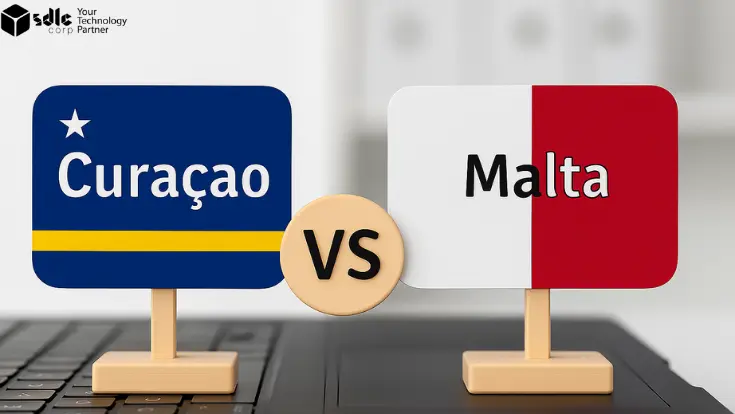In the ever-evolving world of online gaming, acquiring the right iGaming license is a crucial step for operators aiming to run a legitimate and successful gambling business. Two of the most prominent jurisdictions in the iGaming industry are Curacao and Malta. Both offer iGaming licenses, but they differ significantly in terms of regulatory frameworks, tax benefits, application processes, and overall business advantages.
So, Curacao vs Malta iGaming License: Which one is better? This blog will dive deep into the key aspects of each license to help online casino operators make an informed decision on which jurisdiction best suits their business model.
The Importance of iGaming Licenses

Before delving into a comparison of Curacao and Malta, let’s first understand why obtaining an iGaming license is essential for online gambling operators. An iGaming license is a legal document issued by a recognized gaming authority, permitting the operator to offer online gambling services in a specific jurisdiction. This license not only ensures that the operator complies with local laws but also builds trust with players by guaranteeing fair play, secure transactions, and responsible gaming practices.
Operating without a valid gaming license can expose operators to numerous legal and financial risks, including penalties, loss of customer trust, and potential shutdowns. As such, obtaining a license from a reputable jurisdiction like Curacao or Malta is a vital step for any online gambling platform.
Curacao iGaming License: An Overview

Curacao is one of the oldest and most well-established iGaming licensing jurisdictions. It has a reputation for being an accessible and affordable option for online gaming operators. Curacao’s gaming authority, the Curacao eGaming, offers licenses to businesses in the gambling industry, including casinos, sports betting platforms, poker rooms, and more.
Licensing Process in Curacao
The process of obtaining an iGaming license in Curacao is relatively straightforward and can typically be completed within a few weeks. However, operators must meet the following basic requirements:
Minimum Capital Investment: There are no specific capital requirements to obtain a license, which makes it an attractive option for new or small operators.
Company Formation: Operators must set up a business entity within Curacao. This includes registering a company, opening a local bank account, and fulfilling basic corporate tax requirements.
Software Providers and Payment Processors: To comply with Curacao’s licensing rules, operators must partner with software providers and payment processors that are licensed or approved by Curacao eGaming.
Advantages of a Curacao iGaming License
Affordability: One of the most significant benefits of Curacao’s iGaming license is its affordability. With lower licensing fees and minimal operational costs, Curacao is an ideal option for startups and smaller businesses with limited budgets.
Single License: Unlike some jurisdictions that require separate licenses for different types of gaming activities, Curacao offers a single license that covers all forms of online gambling.
Tax Benefits: Curacao offers tax rates as low as 2% for online gambling operations. This is incredibly attractive to operators looking to minimize their tax burden and maximize profits.
Ease of Setup: The licensing process in Curacao is relatively simple and does not require a significant amount of paperwork or regulatory oversight.
Disadvantages of a Curacao iGaming License
Limited Reputation: Curacao has a less stringent regulatory environment compared to jurisdictions like Malta, which may affect its reputation among players. Some customers may be cautious when dealing with Curacao-licensed operators due to concerns about transparency and fairness.
Lack of Strong Consumer Protection: The Curacao licensing process does not offer the same level of consumer protection and player dispute resolution mechanisms as more established jurisdictions like Malta.
Limited Market Access: Certain markets may be restricted for operators with a Curacao license, including the European Union and some parts of the United States.
Malta iGaming License: An Overview

Malta, on the other hand, is one of the most respected jurisdictions in the iGaming industry. The Malta Gaming Authority (MGA) regulates all forms of online gaming and gambling, offering licenses for casinos, poker rooms, sportsbooks, and other types of gaming operations. Malta’s gaming laws are considered highly robust and offer operators a transparent and fair framework to operate in.
Licensing Process in Malta
Malta’s iGaming licensing process is more complex than Curacao’s but offers several benefits in terms of legal protection, regulatory compliance, and market access. Here are the general requirements for obtaining a Malta iGaming license:
Capital Investment: Operators are required to have a higher minimum capital investment compared to Curacao. This ensures that only serious businesses enter the Maltese market.
Company Formation: Operators must establish a company within Malta and submit all necessary documentation regarding ownership structure, business plan, and financial health.
Software Providers and Payment Processors: As with Curacao, operators must ensure that their software providers and payment processors are compliant with Malta’s regulatory framework.
Advantages of a Malta iGaming License
Reputation and Trust: Malta is one of the most respected jurisdictions in the global iGaming industry. A license from the MGA carries significant weight and assures players that they are dealing with a regulated, fair, and trustworthy operator.
Access to European Markets: Malta’s licensing framework offers operators access to European markets, including the United Kingdom and other EU member states. This is a significant advantage for operators who wish to target European players.
Robust Consumer Protection: Malta offers comprehensive consumer protection, including dispute resolution services, player fund protection, and adherence to strict responsible gambling policies.
Tax Benefits: Malta offers a favorable tax environment, with operators paying a relatively low corporate tax rate of 5% on profits. Additionally, Malta’s status within the EU allows operators to benefit from tax treaties and international agreements.
Compliance and Regulations: The Malta Gaming Authority enforces stringent regulatory standards, ensuring that operators meet high levels of security, fairness, and responsible gaming practices.
Disadvantages of a Malta iGaming License
Higher Licensing Fees: While Malta’s license offers significant benefits, it comes with higher costs compared to Curacao. The initial license application fee, as well as annual renewal fees, are higher, making Malta less accessible to smaller or startup operators.
Complex Application Process: The application process for a Malta iGaming license is more time-consuming and involves more paperwork compared to Curacao. Operators must meet strict compliance requirements, which may include detailed audits and regular checks.
Longer Timeframe: Obtaining a Malta gaming license can take several months, which may delay the launch of a new online gambling operation.
Curacao vs Malta: A Direct Comparison

Licensing Costs
Curacao: Licensing fees are significantly lower. Operators can expect to pay between $15,000 and $30,000 annually for a Curacao license.
Malta: The initial licensing fee can range from €2,000 to €25,000, depending on the type of operation. The annual renewal fee can be higher, particularly for larger operations.
Taxation
Curacao: Operators pay a low tax rate of approximately 2% on profits.
Malta: Operators benefit from a corporate tax rate of 5% on profits, which is still competitive, especially considering the benefits that come with it.
Market Access
Curacao: While Curacao offers global market access, it has limited access to certain regions, including the European Union (EU) and the United States (US).
Malta: A Malta iGaming license provides access to European markets, including the UK, and can attract a large number of European players.
Consumer Protection and Reputation
Curacao: Curacao is known for having a more relaxed regulatory environment, which could lead to concerns around consumer protection and fairness.
Malta: Malta offers one of the most robust consumer protection frameworks in the world, making it a preferred jurisdiction for players and operators alike.
Regulatory Environment
Curacao: The Curacao licensing authority has a simpler, less stringent regulatory framework that is more accessible for smaller operators.
Malta: The regulatory framework in Malta is more comprehensive, ensuring high levels of player protection and operational transparency.
Conclusion: Which License is Better?
Choosing between a Curacao iGaming License and a Malta iGaming License depends on several factors, including the operator’s budget, target market, and business goals.
- If you are a small operator or a startup looking for a low-cost and straightforward option, Curacao may be the best choice. Its lower licensing fees, simple application process, and tax benefits make it an attractive option for those with limited resources or who are just starting in the iGaming industry.
- If you are looking for a reputable license with access to European markets, strong consumer protection, and robust regulatory standards, Malta is the better choice. While the process is more expensive and time-consuming, the benefits of a Malta license far outweigh the costs for businesses aiming for long-term growth and success.
For operators who want expert guidance on the application process or need help navigating licensing requirements, contact us SDLC Corp we offers comprehensive support in obtaining iGaming licenses in both Curacao and Malta.
FAQ's
What is the Difference Between Curacao and Malta Igaming Licenses?
Curacao offers a more affordable and straightforward licensing process, with lower fees and fewer regulatory requirements. Malta, on the other hand, provides a more reputable and robust licensing framework with greater access to European markets, stronger consumer protection, and higher regulatory standards.
Which License is Cheaper: Curacao or Malta?
Curacao iGaming licenses are generally more affordable, with annual fees ranging between $15,000 and $30,000. Malta’s initial license application fee can range from €2,000 to €25,000, but the renewal fees are higher, and the application process is more complex.
What Are the Tax Benefits of Having a Curacao Igaming License?
Curacao offers a very low tax rate of around 2% on profits, which is highly attractive to online gambling operators looking to minimize their tax burden.
Can I Target European Players With a Curacao Igaming License?
Curacao provides global market access but has limited access to certain markets, including the European Union (EU) and the United States. If targeting European players is crucial for your business, a Malta iGaming license might be a better option.
What Are the Key Advantages of a Malta Igaming License?
Malta offers a strong reputation, access to European markets, comprehensive consumer protection, and a regulatory framework that ensures high levels of security and fairness. Malta’s iGaming license also offers tax benefits and adherence to responsible gambling policies.



